SNPG903: Nursing Reflection on Cultural Competence in Healthcare
VerifiedAdded on 2022/12/12
|6
|1384
|454
Report
AI Summary
This nursing reflection explores the importance of cultural competence in healthcare through the lens of a clinical incident involving an Aboriginal patient. The assignment utilizes Rolfe's Reflective Model to analyze the author's personal perceptions and values and how they influence care provision. The author describes a situation where an Aboriginal patient, Mr. Boulia, presented with chest pain and breathlessness, highlighting issues related to his health awareness and lifestyle choices. The reflection delves into the impact of cultural differences on healthcare access and outcomes, particularly for Aboriginal populations. The author initially struggled with judging the patient but then realized the importance of providing quality care irrespective of the patient's background. The reflection concludes with the author's commitment to enhancing cultural competence in nursing practice by incorporating patient-centered communication, cultural sensitivity, and ethical values to improve patient outcomes and address healthcare disparities. The author aims to educate patients based on their cultural background and align care accordingly.
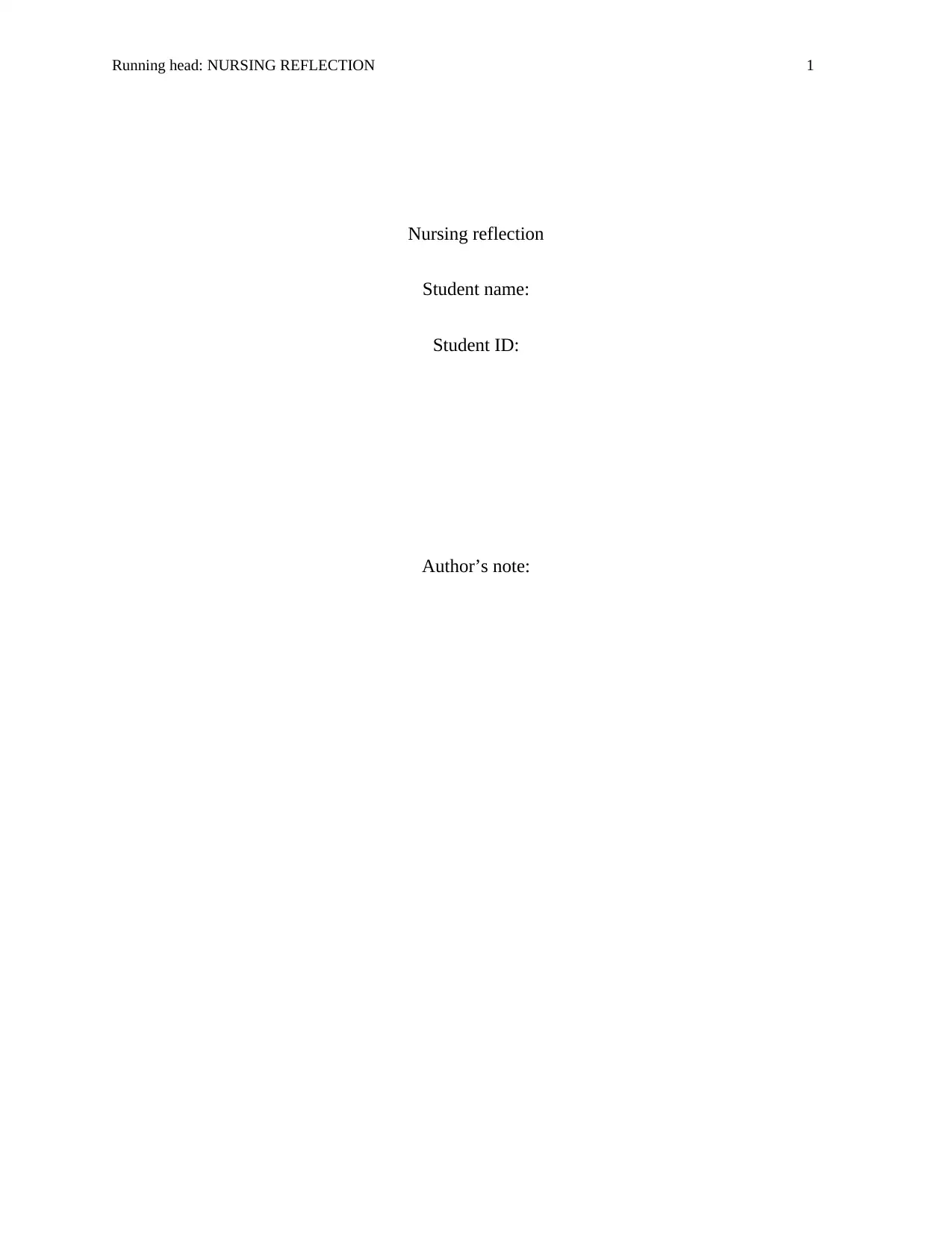
Running head: NURSING REFLECTION 1
Nursing reflection
Student name:
Student ID:
Author’s note:
Nursing reflection
Student name:
Student ID:
Author’s note:
Paraphrase This Document
Need a fresh take? Get an instant paraphrase of this document with our AI Paraphraser
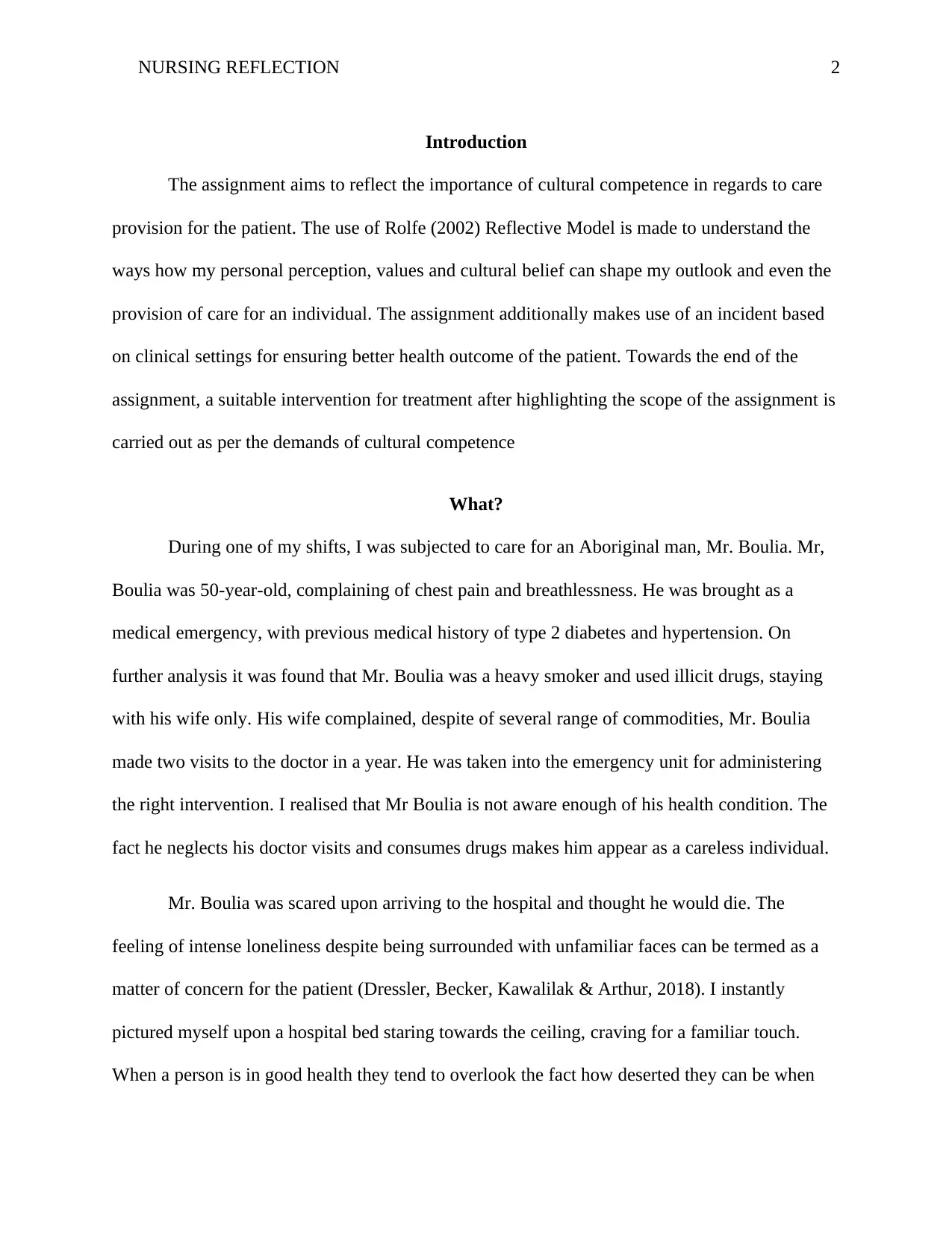
NURSING REFLECTION 2
Introduction
The assignment aims to reflect the importance of cultural competence in regards to care
provision for the patient. The use of Rolfe (2002) Reflective Model is made to understand the
ways how my personal perception, values and cultural belief can shape my outlook and even the
provision of care for an individual. The assignment additionally makes use of an incident based
on clinical settings for ensuring better health outcome of the patient. Towards the end of the
assignment, a suitable intervention for treatment after highlighting the scope of the assignment is
carried out as per the demands of cultural competence
What?
During one of my shifts, I was subjected to care for an Aboriginal man, Mr. Boulia. Mr,
Boulia was 50-year-old, complaining of chest pain and breathlessness. He was brought as a
medical emergency, with previous medical history of type 2 diabetes and hypertension. On
further analysis it was found that Mr. Boulia was a heavy smoker and used illicit drugs, staying
with his wife only. His wife complained, despite of several range of commodities, Mr. Boulia
made two visits to the doctor in a year. He was taken into the emergency unit for administering
the right intervention. I realised that Mr Boulia is not aware enough of his health condition. The
fact he neglects his doctor visits and consumes drugs makes him appear as a careless individual.
Mr. Boulia was scared upon arriving to the hospital and thought he would die. The
feeling of intense loneliness despite being surrounded with unfamiliar faces can be termed as a
matter of concern for the patient (Dressler, Becker, Kawalilak & Arthur, 2018). I instantly
pictured myself upon a hospital bed staring towards the ceiling, craving for a familiar touch.
When a person is in good health they tend to overlook the fact how deserted they can be when
Introduction
The assignment aims to reflect the importance of cultural competence in regards to care
provision for the patient. The use of Rolfe (2002) Reflective Model is made to understand the
ways how my personal perception, values and cultural belief can shape my outlook and even the
provision of care for an individual. The assignment additionally makes use of an incident based
on clinical settings for ensuring better health outcome of the patient. Towards the end of the
assignment, a suitable intervention for treatment after highlighting the scope of the assignment is
carried out as per the demands of cultural competence
What?
During one of my shifts, I was subjected to care for an Aboriginal man, Mr. Boulia. Mr,
Boulia was 50-year-old, complaining of chest pain and breathlessness. He was brought as a
medical emergency, with previous medical history of type 2 diabetes and hypertension. On
further analysis it was found that Mr. Boulia was a heavy smoker and used illicit drugs, staying
with his wife only. His wife complained, despite of several range of commodities, Mr. Boulia
made two visits to the doctor in a year. He was taken into the emergency unit for administering
the right intervention. I realised that Mr Boulia is not aware enough of his health condition. The
fact he neglects his doctor visits and consumes drugs makes him appear as a careless individual.
Mr. Boulia was scared upon arriving to the hospital and thought he would die. The
feeling of intense loneliness despite being surrounded with unfamiliar faces can be termed as a
matter of concern for the patient (Dressler, Becker, Kawalilak & Arthur, 2018). I instantly
pictured myself upon a hospital bed staring towards the ceiling, craving for a familiar touch.
When a person is in good health they tend to overlook the fact how deserted they can be when
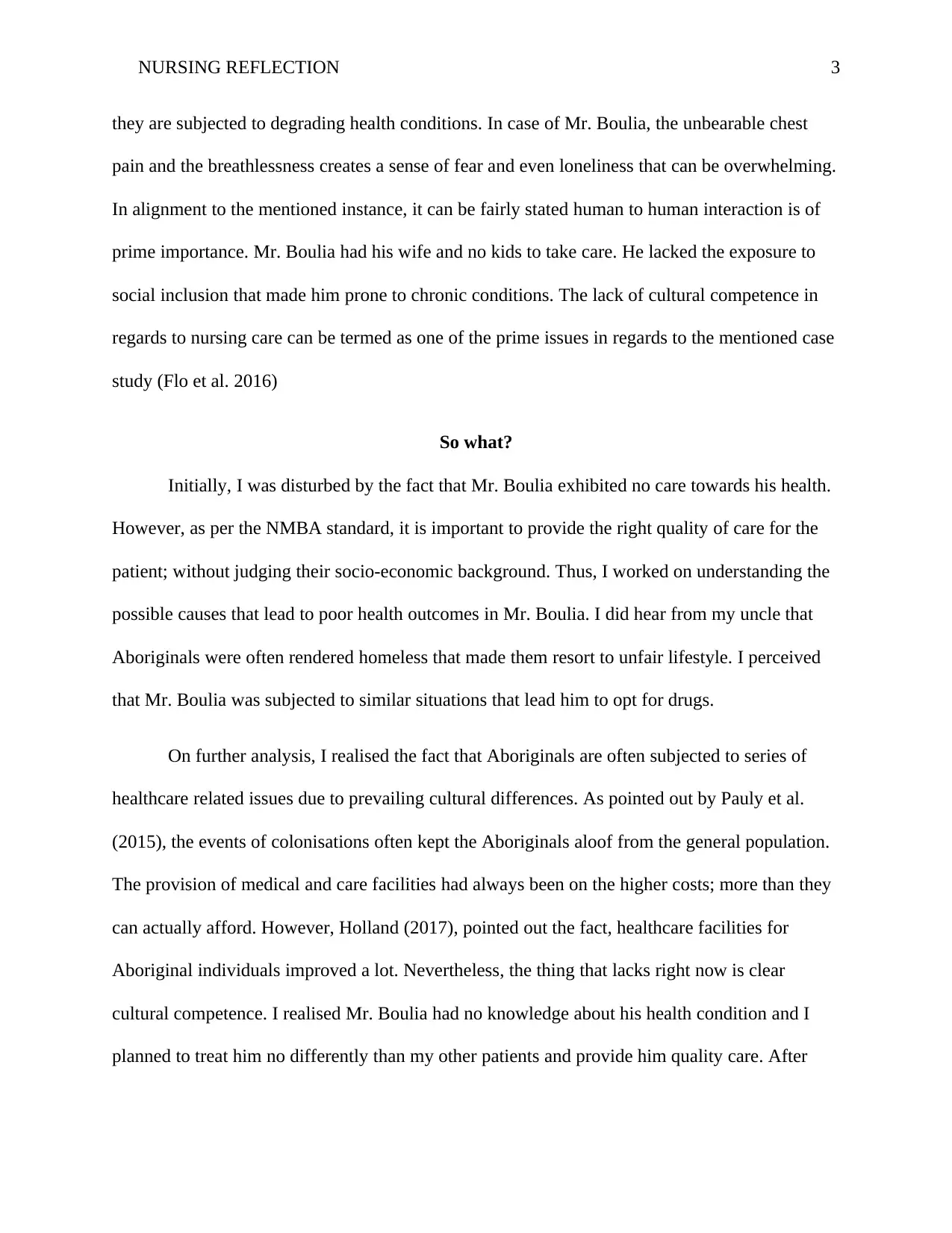
NURSING REFLECTION 3
they are subjected to degrading health conditions. In case of Mr. Boulia, the unbearable chest
pain and the breathlessness creates a sense of fear and even loneliness that can be overwhelming.
In alignment to the mentioned instance, it can be fairly stated human to human interaction is of
prime importance. Mr. Boulia had his wife and no kids to take care. He lacked the exposure to
social inclusion that made him prone to chronic conditions. The lack of cultural competence in
regards to nursing care can be termed as one of the prime issues in regards to the mentioned case
study (Flo et al. 2016)
So what?
Initially, I was disturbed by the fact that Mr. Boulia exhibited no care towards his health.
However, as per the NMBA standard, it is important to provide the right quality of care for the
patient; without judging their socio-economic background. Thus, I worked on understanding the
possible causes that lead to poor health outcomes in Mr. Boulia. I did hear from my uncle that
Aboriginals were often rendered homeless that made them resort to unfair lifestyle. I perceived
that Mr. Boulia was subjected to similar situations that lead him to opt for drugs.
On further analysis, I realised the fact that Aboriginals are often subjected to series of
healthcare related issues due to prevailing cultural differences. As pointed out by Pauly et al.
(2015), the events of colonisations often kept the Aboriginals aloof from the general population.
The provision of medical and care facilities had always been on the higher costs; more than they
can actually afford. However, Holland (2017), pointed out the fact, healthcare facilities for
Aboriginal individuals improved a lot. Nevertheless, the thing that lacks right now is clear
cultural competence. I realised Mr. Boulia had no knowledge about his health condition and I
planned to treat him no differently than my other patients and provide him quality care. After
they are subjected to degrading health conditions. In case of Mr. Boulia, the unbearable chest
pain and the breathlessness creates a sense of fear and even loneliness that can be overwhelming.
In alignment to the mentioned instance, it can be fairly stated human to human interaction is of
prime importance. Mr. Boulia had his wife and no kids to take care. He lacked the exposure to
social inclusion that made him prone to chronic conditions. The lack of cultural competence in
regards to nursing care can be termed as one of the prime issues in regards to the mentioned case
study (Flo et al. 2016)
So what?
Initially, I was disturbed by the fact that Mr. Boulia exhibited no care towards his health.
However, as per the NMBA standard, it is important to provide the right quality of care for the
patient; without judging their socio-economic background. Thus, I worked on understanding the
possible causes that lead to poor health outcomes in Mr. Boulia. I did hear from my uncle that
Aboriginals were often rendered homeless that made them resort to unfair lifestyle. I perceived
that Mr. Boulia was subjected to similar situations that lead him to opt for drugs.
On further analysis, I realised the fact that Aboriginals are often subjected to series of
healthcare related issues due to prevailing cultural differences. As pointed out by Pauly et al.
(2015), the events of colonisations often kept the Aboriginals aloof from the general population.
The provision of medical and care facilities had always been on the higher costs; more than they
can actually afford. However, Holland (2017), pointed out the fact, healthcare facilities for
Aboriginal individuals improved a lot. Nevertheless, the thing that lacks right now is clear
cultural competence. I realised Mr. Boulia had no knowledge about his health condition and I
planned to treat him no differently than my other patients and provide him quality care. After
⊘ This is a preview!⊘
Do you want full access?
Subscribe today to unlock all pages.

Trusted by 1+ million students worldwide
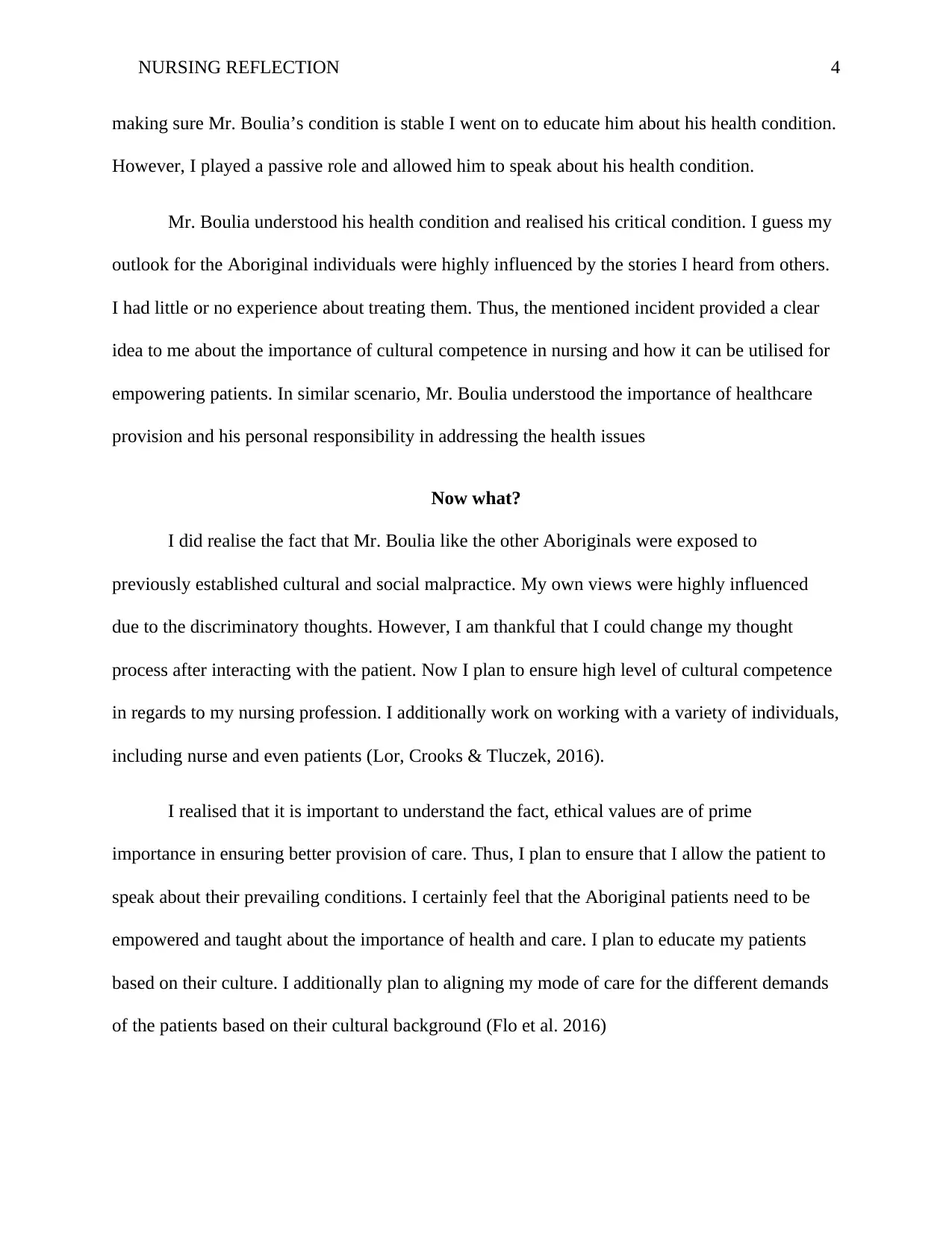
NURSING REFLECTION 4
making sure Mr. Boulia’s condition is stable I went on to educate him about his health condition.
However, I played a passive role and allowed him to speak about his health condition.
Mr. Boulia understood his health condition and realised his critical condition. I guess my
outlook for the Aboriginal individuals were highly influenced by the stories I heard from others.
I had little or no experience about treating them. Thus, the mentioned incident provided a clear
idea to me about the importance of cultural competence in nursing and how it can be utilised for
empowering patients. In similar scenario, Mr. Boulia understood the importance of healthcare
provision and his personal responsibility in addressing the health issues
Now what?
I did realise the fact that Mr. Boulia like the other Aboriginals were exposed to
previously established cultural and social malpractice. My own views were highly influenced
due to the discriminatory thoughts. However, I am thankful that I could change my thought
process after interacting with the patient. Now I plan to ensure high level of cultural competence
in regards to my nursing profession. I additionally work on working with a variety of individuals,
including nurse and even patients (Lor, Crooks & Tluczek, 2016).
I realised that it is important to understand the fact, ethical values are of prime
importance in ensuring better provision of care. Thus, I plan to ensure that I allow the patient to
speak about their prevailing conditions. I certainly feel that the Aboriginal patients need to be
empowered and taught about the importance of health and care. I plan to educate my patients
based on their culture. I additionally plan to aligning my mode of care for the different demands
of the patients based on their cultural background (Flo et al. 2016)
making sure Mr. Boulia’s condition is stable I went on to educate him about his health condition.
However, I played a passive role and allowed him to speak about his health condition.
Mr. Boulia understood his health condition and realised his critical condition. I guess my
outlook for the Aboriginal individuals were highly influenced by the stories I heard from others.
I had little or no experience about treating them. Thus, the mentioned incident provided a clear
idea to me about the importance of cultural competence in nursing and how it can be utilised for
empowering patients. In similar scenario, Mr. Boulia understood the importance of healthcare
provision and his personal responsibility in addressing the health issues
Now what?
I did realise the fact that Mr. Boulia like the other Aboriginals were exposed to
previously established cultural and social malpractice. My own views were highly influenced
due to the discriminatory thoughts. However, I am thankful that I could change my thought
process after interacting with the patient. Now I plan to ensure high level of cultural competence
in regards to my nursing profession. I additionally work on working with a variety of individuals,
including nurse and even patients (Lor, Crooks & Tluczek, 2016).
I realised that it is important to understand the fact, ethical values are of prime
importance in ensuring better provision of care. Thus, I plan to ensure that I allow the patient to
speak about their prevailing conditions. I certainly feel that the Aboriginal patients need to be
empowered and taught about the importance of health and care. I plan to educate my patients
based on their culture. I additionally plan to aligning my mode of care for the different demands
of the patients based on their cultural background (Flo et al. 2016)
Paraphrase This Document
Need a fresh take? Get an instant paraphrase of this document with our AI Paraphraser
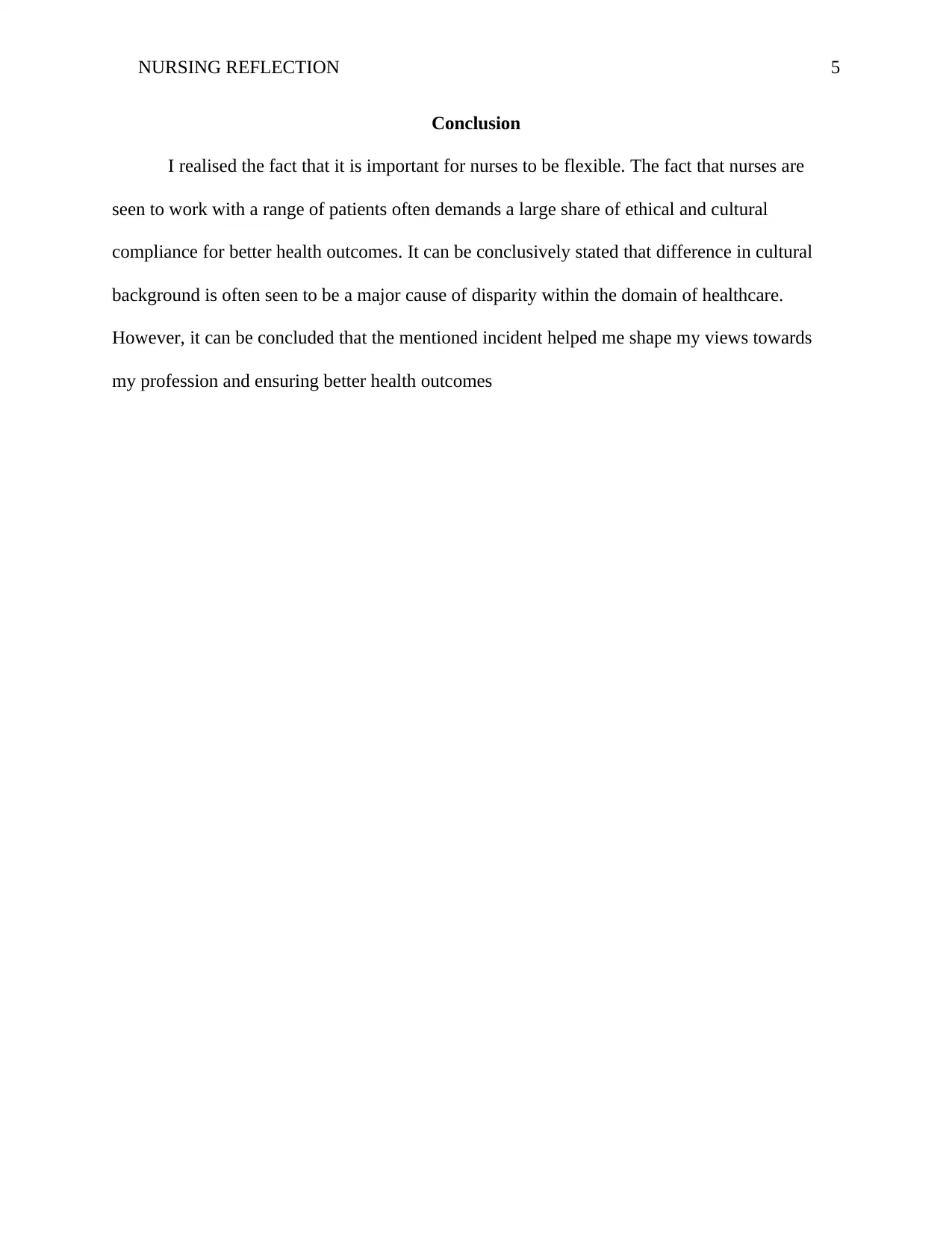
NURSING REFLECTION 5
Conclusion
I realised the fact that it is important for nurses to be flexible. The fact that nurses are
seen to work with a range of patients often demands a large share of ethical and cultural
compliance for better health outcomes. It can be conclusively stated that difference in cultural
background is often seen to be a major cause of disparity within the domain of healthcare.
However, it can be concluded that the mentioned incident helped me shape my views towards
my profession and ensuring better health outcomes
Conclusion
I realised the fact that it is important for nurses to be flexible. The fact that nurses are
seen to work with a range of patients often demands a large share of ethical and cultural
compliance for better health outcomes. It can be conclusively stated that difference in cultural
background is often seen to be a major cause of disparity within the domain of healthcare.
However, it can be concluded that the mentioned incident helped me shape my views towards
my profession and ensuring better health outcomes
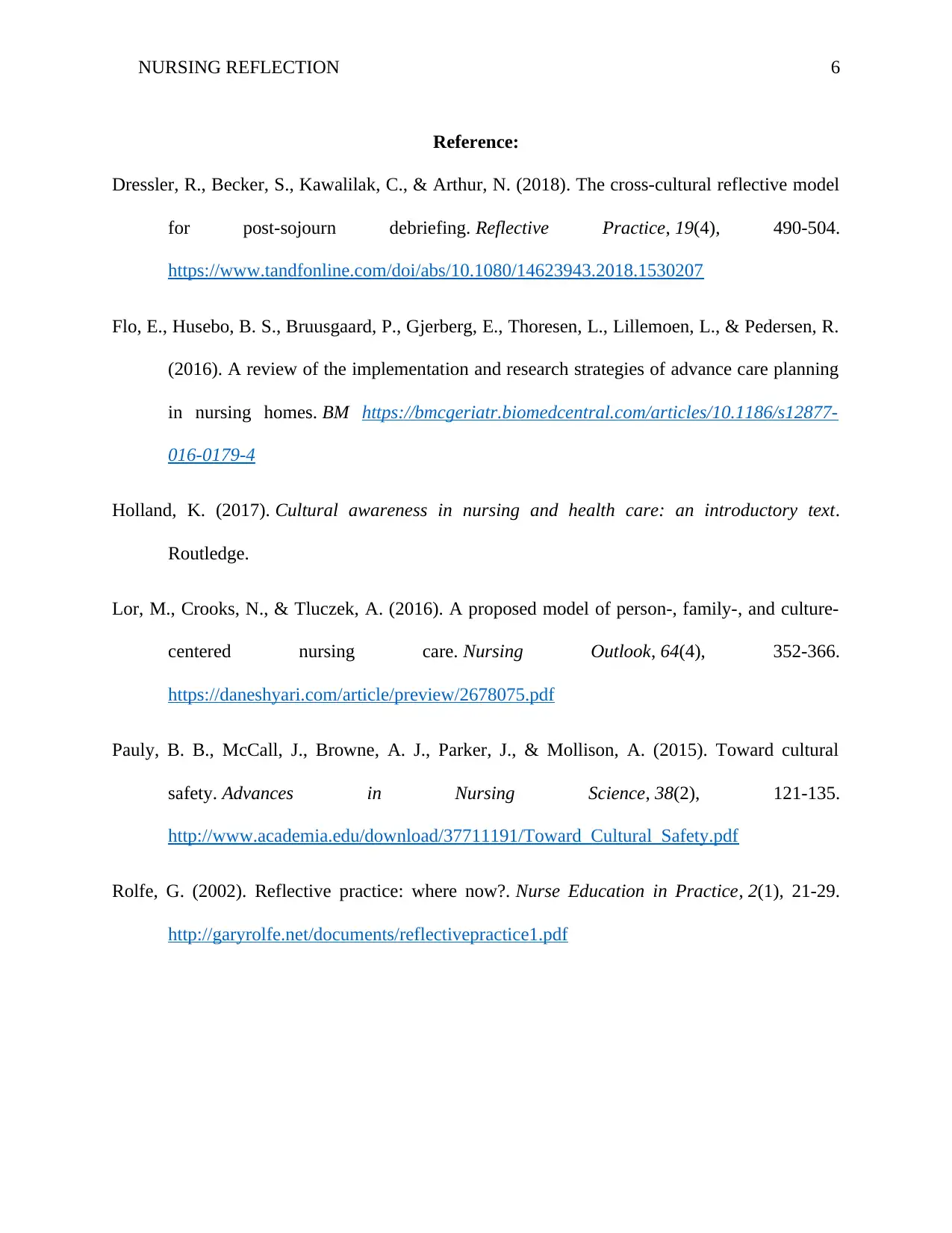
NURSING REFLECTION 6
Reference:
Dressler, R., Becker, S., Kawalilak, C., & Arthur, N. (2018). The cross-cultural reflective model
for post-sojourn debriefing. Reflective Practice, 19(4), 490-504.
https://www.tandfonline.com/doi/abs/10.1080/14623943.2018.1530207
Flo, E., Husebo, B. S., Bruusgaard, P., Gjerberg, E., Thoresen, L., Lillemoen, L., & Pedersen, R.
(2016). A review of the implementation and research strategies of advance care planning
in nursing homes. BM https://bmcgeriatr.biomedcentral.com/articles/10.1186/s12877-
016-0179-4
Holland, K. (2017). Cultural awareness in nursing and health care: an introductory text.
Routledge.
Lor, M., Crooks, N., & Tluczek, A. (2016). A proposed model of person-, family-, and culture-
centered nursing care. Nursing Outlook, 64(4), 352-366.
https://daneshyari.com/article/preview/2678075.pdf
Pauly, B. B., McCall, J., Browne, A. J., Parker, J., & Mollison, A. (2015). Toward cultural
safety. Advances in Nursing Science, 38(2), 121-135.
http://www.academia.edu/download/37711191/Toward_Cultural_Safety.pdf
Rolfe, G. (2002). Reflective practice: where now?. Nurse Education in Practice, 2(1), 21-29.
http://garyrolfe.net/documents/reflectivepractice1.pdf
Reference:
Dressler, R., Becker, S., Kawalilak, C., & Arthur, N. (2018). The cross-cultural reflective model
for post-sojourn debriefing. Reflective Practice, 19(4), 490-504.
https://www.tandfonline.com/doi/abs/10.1080/14623943.2018.1530207
Flo, E., Husebo, B. S., Bruusgaard, P., Gjerberg, E., Thoresen, L., Lillemoen, L., & Pedersen, R.
(2016). A review of the implementation and research strategies of advance care planning
in nursing homes. BM https://bmcgeriatr.biomedcentral.com/articles/10.1186/s12877-
016-0179-4
Holland, K. (2017). Cultural awareness in nursing and health care: an introductory text.
Routledge.
Lor, M., Crooks, N., & Tluczek, A. (2016). A proposed model of person-, family-, and culture-
centered nursing care. Nursing Outlook, 64(4), 352-366.
https://daneshyari.com/article/preview/2678075.pdf
Pauly, B. B., McCall, J., Browne, A. J., Parker, J., & Mollison, A. (2015). Toward cultural
safety. Advances in Nursing Science, 38(2), 121-135.
http://www.academia.edu/download/37711191/Toward_Cultural_Safety.pdf
Rolfe, G. (2002). Reflective practice: where now?. Nurse Education in Practice, 2(1), 21-29.
http://garyrolfe.net/documents/reflectivepractice1.pdf
⊘ This is a preview!⊘
Do you want full access?
Subscribe today to unlock all pages.

Trusted by 1+ million students worldwide
1 out of 6
Related Documents
Your All-in-One AI-Powered Toolkit for Academic Success.
+13062052269
info@desklib.com
Available 24*7 on WhatsApp / Email
![[object Object]](/_next/static/media/star-bottom.7253800d.svg)
Unlock your academic potential
Copyright © 2020–2026 A2Z Services. All Rights Reserved. Developed and managed by ZUCOL.





